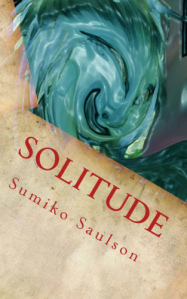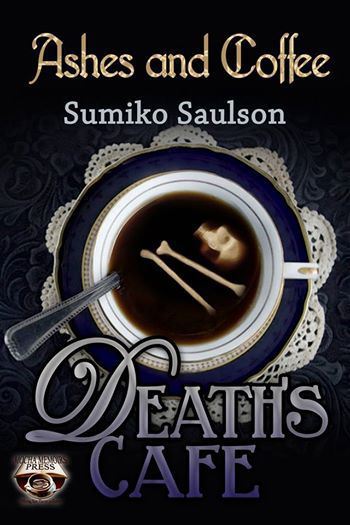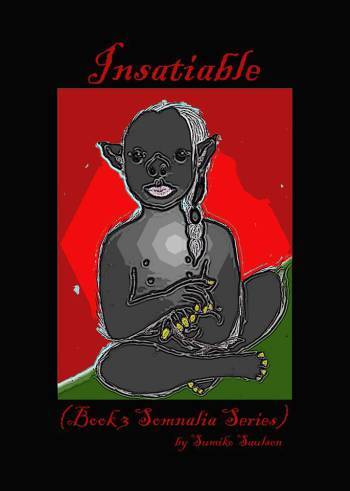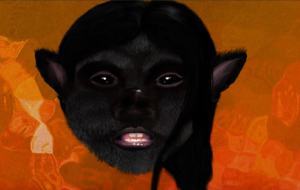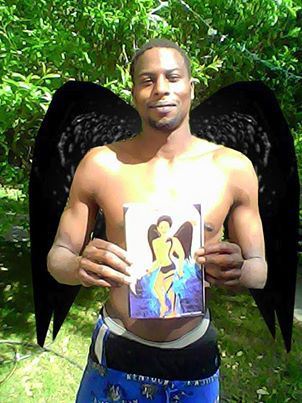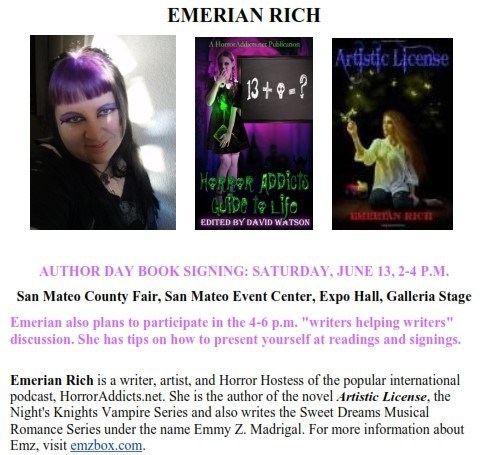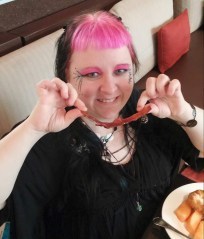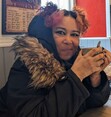Sumiko Saulson's Blog, page 33
July 31, 2015
I’ll be at Convolution with hot copies of the 3rd “Happiness and Other Diseases” book
Lori Titus, Bret Alexander Sweet, Emerian Rich, and MOI will be panelists at Con-Volution which is October 2-4 at Hyatt Regency San Francisco Airport. Honored guests and featured guests include actual famous people, like Balogun Ojetade. This year’s Con-Volution is “Legion of Fandom” and it’s all about diversity in fandom. Which is awesome!
So say, you’re a fan of ME, Sumiko Saulson, author.
You can get a $5 discount on a ticket to Con-Volution if you use the code: SumikoS15
And you purchase your badge between August 1st through August 17th. That’s going to cost you $50 for an ALL WEEKEND PASS. Totally worth it. For real.
Also, the THIRD BOOK in the “Happiness Happiness and Other Diseases” trilogy, “Insatiable”, is coming out October 1, 2015 which means copies of it WILL BE AVAILABLE for $10 mass market, $15 standard paperback, $25 hardcover.
But if you should happen to be so danged hardcore in your Sumiko Saulson fandom that you’d show up in a Sumiko Saulson character cosplay, I will totally sign and give you a $15 book for free. Like on the spot. And take a gazillion photos with you. And possibly love you forever and ever.
Characters You Might Want To Be
You don’t know what my characters look like, you say. Well fine. Here are some.
Sera
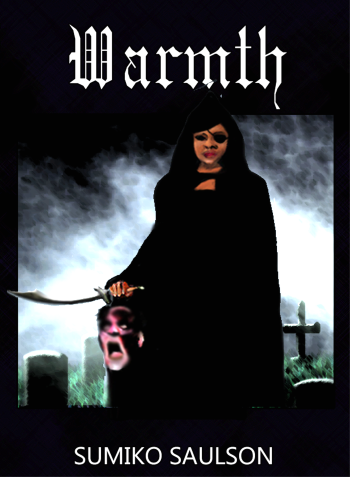 Sera is a 600 year old pregnant ghoul. She’s a Spanish Moor and in case you didn’t know it, she’s of African and Middle Eastern ethnic heritage, but it’s cosplay so you can totally dress like her no matter what race you are, or if you are a dude, I don’t care, just please don’t wear black face when you do it, Sumiko don’t like that. She carries two scythes. She wears a long black cloak. A zombie chewed her eye out, so she has facial scars and a bad ass eyepatch. She got a few tats on her face to minimize the appearance of her scars, but they aren’t very prominent. She’s got further scars from back when she had small pox – kinda looks like acne. She sharpened her teeth like a shark, to make it easier to eat human flesh. She looks about nineteen. She’s hella cool. You should totally read the book, Warmth, so you can be just like her when you grow up.
Sera is a 600 year old pregnant ghoul. She’s a Spanish Moor and in case you didn’t know it, she’s of African and Middle Eastern ethnic heritage, but it’s cosplay so you can totally dress like her no matter what race you are, or if you are a dude, I don’t care, just please don’t wear black face when you do it, Sumiko don’t like that. She carries two scythes. She wears a long black cloak. A zombie chewed her eye out, so she has facial scars and a bad ass eyepatch. She got a few tats on her face to minimize the appearance of her scars, but they aren’t very prominent. She’s got further scars from back when she had small pox – kinda looks like acne. She sharpened her teeth like a shark, to make it easier to eat human flesh. She looks about nineteen. She’s hella cool. You should totally read the book, Warmth, so you can be just like her when you grow up.
Charlotte Metaxas
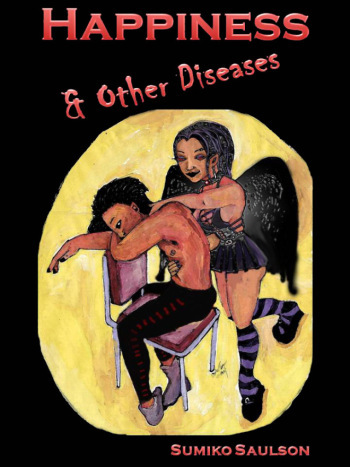
Happiness
Charlotte is a demigoddess, the daughter of one of the Greco-Roman dream deities called the Oneiroi. Morpheus is the most famous of the Oneiroi, but that’s not her father. Her dad’s name is Brash, and he totally pretended to be Morpheus to seduce Charlotte’s mother Maribelle back in the 80s, because Maribelle was a big Neil Gaiman fan. Like the Oneiroi, Charlotte presents in the dream world as a human with big, black wings. She’s a goth chick. She loves purple and black stripped stockings. She has purple or partially purple hair. Is she Greek? Yeah, she’s Greek and Persian, duh, she’s a Greco-Roman demigoddess. She has facial piercings: an eyebrow ring, a lip ring, and a nose ring. You should probably just buy the book Happiness and Other Diseases.
X’ahsia
This would be especially challenging since (SPOILER ALERT)
X’ahsia is not human. In fact, X’ahsia is not even a single organism, but a collection of microscopic alien beings that have gathered together to form a single hive-mind entity. Although physically agender, X’ahsia eventually decides to identify as male, but is at various and sundry points genderfluid. He’s color-adaptive, more like a mood ring than a chameleon, and is variously purple, green or blue. He made his body sort of vaguely stereotypically Grey Alien like, but not entirely. Yeah, that’s him on the cover. He can shape shift – he was a rat once. He can possess people’s bodies. His eyes are described (in the unpublished sequel) as large, ovular orbs that tip up on the exterior edges, pure gold in color with flecks of bright shining metallic particles. Anyway, you should probably just read the book Solitude.
“Red” Montgomery
Red is a nineteen year old African American punk rock girl who sports a red mohawk and favors short, plaid skirts, combat boots, fishnets, and t-shirts with snarky sayings that have something to do with death. She’s being stalked by death, we’re not sure why yet. I mean I can’t be spoilering my own book. At some points in this story, she’s homeless, so her look may be a bit grungy. She’s totally Berkeley and she’s also a lesbian in case you didn’t know. Anyway you should totally buy this book Ashes and Coffee. So you can get it right!
Nomi, or Nolan
Nomi and Nolan are both characters from “Insatiable,” which is Book Three in the series. I called it the Somnalia series, but I’m rethinking that since Somnalia is the second book. Happiness and Other Diseases was the first. Nomi is a werepig or akmani – that’s her on the cover. She is a short person – a bit under 5 feet tall in her akmani form. In her akmani form, she has short, black fur, and jet black eyes. Yes, she does have a long, black ponytail. Here’s another picture of her that Josh Bisher made:
Nolan is a tall, very thin, very pale guy with completely silver eyes (not irises, the entire eyeball) who is variously, completely hairless, or with very short, white hair. He no longer looks entirely human. Also, he’s blind. And perverted. If you’ve read the book (which, only my editor and beta readers have) you know that when this character is introduced, he’s being used as a pincushion by the arch villain, so he may or may not be covered in straight pins at some point. If you were feeling really gung-ho.
Phobetor (or perhaps, Flynn Keahi)
Phobetor is an actual Greco-Roman god, the god of nightmares. He has many forms, one of which looks like a scary ass mangled dead tree, and several of which are animals, since he is also the god of the werebeasts for some reason. He is being portrayed by my hunky cousin Christopher in this photo. In Book 2 of the Somnalia/Happiness and Other Diseases series, Phobetor is a very tall, muscular but on the slimmer side, incredibly ectomorphic black guy who has big, black Oneiroi wings, is built, well… like a god, and doesn’t wear very much clothing. He is whatever age he feels like being, because he’s a god.
Now, that’s actually Flynn on the book cover he’s holding. I don’t want to spoiler alert my own book, but that thing that looks like a big snake tattoo on his chest is in fact, ALIVE. You know, just to make sure there are no spoilers, maybe you should READ THE BOOK, Somnalia


July 17, 2015
The Anatomy of a Writer’s Block
 The last time my dad saw Joe, it was the eve of Thanksgiving 2012. He was waking him up from the couch over on Ellis Street for the final time.
The last time my dad saw Joe, it was the eve of Thanksgiving 2012. He was waking him up from the couch over on Ellis Street for the final time.
“Get up, Joe,” Daddy said, shaking him. “Wake up. Miki has to go home.”
I can see it now, in a round portal viewing window of distant memory. I can see it, sitting at the computer, listening to that Incubus song, “Drive.” I don’t have a Chevy Impala like Sam and Dean Winchester. I don’t have a little red Saturn with Hello Kitty floor mats yet, either. I still have a big green Crown Victoria. It looks like a cop car, or a taxicab, and it’s built like a tank.
I flip over to Youtube and make the Incubus video repeat, because I need it to write with.
“Whatever tomorrow brings, I’ll be there, with open arms and open eyes,” the refrain repeats. Brandon Boyd isn’t wearing a shirt, because men were allergic to shirts in late 90s and early 2000s music videos. This is something having to do with men, and little girls who miss their fathers.
Still…
“Lately, I’m beginning to find that I should be the one behind the wheel…”
“Get up,” Dad tells Joe. “Miki has to drive.”
I can see it all going backwards and forward, everything that has to do with little girls and how we love our fathers. My daddy didn’t teach me to drive until he took me to the Department of Motor Vehicles in Vallejo, California when I was thirty-eight years old. Once, when I was twelve, he tried to, but I messed up and backed his baby blue Lincoln Continental into a ditch.
Joe was always sleeping, like a cat. Me, I’m usually channeling Anthony Kiedis, or Martin Gore. Who is this Brandon Boyd, anyway?
“I thought I was the one who was channeling Anthony Kiedis,” Flynn said. He had a point. According to Somnalia, Red Hot Chili Peppers was Flynn’s favorite band.
I turned around and took a look at him. “What are you doing here?”
“I’m stuck here until you finish going through whatever it is you’re going through,” he answered. “I know what you’re thinking, I should be in books. You should be writing me. But no, you have me running around holding your hand. No wonder we have writer’s block.”
“We?” I asked, incredulous.
“Oh yeah,” he sighed. “I’m you. Duh.” He started laughing uncontrollably, like it was the funniest thing he’d ever heard, and he as perhaps, a bit tipsy. “Well, a part of you, at any rate. Don’t let anyone tell you otherwise. You writers are always talking to yourselves.”
“Whatever, dude,” I said, rolling my eyes.
“You need to go back to 2012 and get your ex off the couch,” he said sternly.
Joe got up off the couch, and I gave my dad an awkward hug. Dad was so fragile lately, and in so much pain that I was afraid to squeeze him very hard. I would regret not hugging him more, after he died. My brother was always touching Dad in those final days. We would be sitting by his bedside, and Scott would be closest. He would be rubbing his back. Scott and Dad were always the closest to each other. On January 3, 2013, my father died in my brother’s arms. Scott bought him back to life for a little while. He was giving him CPR. He restarted his heart. But it couldn’t last. My daddy died anyway.
“It’s going to be okay,” my dad says. He’s dead, but he believes he’s still living somewhere in my molecules and, frankly, I have so many voices in my head already that I’m sure it’s true.
“How the hell it’s going to be okay?” I asked him. “Joe’s ass is out in the streets getting high. He’s been doing meth. No wonder his teeth are rotten.”
“Well I can’t see how you’re supposed to write fiction with all of this fact going on,” my father admonished me, looking simultaneously bored and distressed. “Hey! I heard Franchesca is writing these days.”
“Yeah, she is, dad,” I said with a little grin.
“You got this, Miki,” Dad said, but he didn’t really sound like himself. He sounded like me. “You got this, Miki,” he said. “You’re a pimp.”
I laughed. “Really, now?”
“Yeah, a pimp,” I said. “Stop crying, girl, you know you run this.”
But I knew I was full of it. I wasn’t running shit. I should have been writing. I had three quarters of a novel. I had several requests for short fiction that I was completely unable to write. I wasn’t at home writing, I was out at karaoke bars screaming angry music along with the voices in my head.
It was the Foo Fighters this time, “The Pretender.”
“It’s true,” dad somberly confirmed. “We are temporary, but what are you going to do about it, right? Be angry? I practice radical acceptance here. I’m dead, and I accept that. Now, maybe you should try and relax. Your acid reflux is acting up.”
I relaxed a little, because Flynn was rubbing my back again. I would calm down soon, and all of us could go back to bed. We needed to go to bed. It was almost five in the morning. What were we doing up again, anyway?
“You were mad,” Flynn explained. “You were trying to set boundaries with Joe or something, and your friend couldn’t understand.”
I nodded. “My name is Sumiko Saulson. I’m the adult child of an addict.”
Flynn frowned. “You know you can’t save them, right?”
“I know,” I mumbled under my breath, folding up my cape and putting it away.
Anticipatory grief is what they called it when I began to mourn before my father died. Anticipatory grief is what I felt when Joe called me up two months ago, to let me know he checked himself out of his program. It’s what I felt when he let me know he was out running the streets, not taking care of his health. If you met someone when he was twenty-two, and you dated until he was almost twenty-nine, could you feel nothing about it? I can’t feel nothing about it.
But he needs to stay on his cocktail, and I can’t make him. I can’t fix him. I can’t fix anyone. I’m doing good to take care of myself, out here on my own.
“You don’t have to fix everything, little girl,” he said, giving me a hug. “It’s not your fault.”
“But what if he dies?” I ask. “Norman’s been on chat freaking out about this – what if he dies? As if me ending up in the hospital is going to really help Joe. As if I can’t or won’t end up in the hospital. As if I don’t know that Joe’s guilt tripping the fuck out of me, hoping I’ll feel so bad I’ll let him do what the hell ever.
“He’s not going to die,” Flynn insisted. “At least not today, and I know you’re upset, because your dad wanted to die, and you couldn’t stop him.”
“He wanted to,” I mumbled numbly. “You’re right, I couldn’t stop it.”
“You can’t make people want to live,” he cautioned.
I got really quiet all of the sudden. “Do you think he really wants to die?”
“Hell no,” Flynn scowled, “He wants to punish you. He doesn’t want to die. He wants to punish you for leaving him.”


July 5, 2015
You should be reading Sumiko Saulson
July 4, 2015
Her Independence Day
I sought my independence with legs as wobbly as a toddler taking her first steps. I walked away from your cold indifference and I sought the warmth of loving a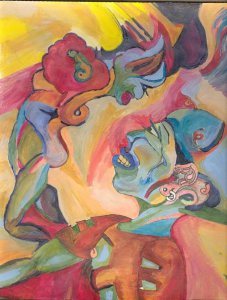 rms. I dropped down to my knees, and I picked up my tired from off the floor.
rms. I dropped down to my knees, and I picked up my tired from off the floor.
“You don’t have to try so hard, little one,” I said gently.
“Some people will never understand you. You will never be good enough for some people. But you can’t live for them, my love. You gotta live for you now. I know it’s not easy.”
I was confused, because I lived for others all my life, and I lived for you most of all. There were so many times I looked to you to love me. There were so many times you were disappointed. I could hurt someone else for loving you, someone innocent who never put me in harm’s way. I could lose my faith in mankind for trusting you. I shouldn’t trust you to be anything but who you are.
Love is unconditional, but relationships are not. They are conditional, and boundaries have to be set. I’m so soft and easy and you step all over me. When you hurt me, you say it’s my fault. But it is not my fault that I am hurt, and I am not overly sensitive.
It is you who are brutally cruel.
Do you think your insensitivity makes you strong? I believe that it makes you weak. All of the people who were open and vulnerable with you that you used and sucked dry. There were so many people who cared. How you made them pay for their concern.
Maybe you can’t help yourself, the way my cat can’t help hunting birds. Maybe it is just your nature, and if I want to survive, I need to spread my wings and fly away. Because a cat can’t really love a bird, now can she?


July 1, 2015
An Excerpt from “Solitude: Disillusionment”
I’m still working on the sequel to “Solitude” – my debut novel. Here is a little treat for fans of the work. This is a segment from the book, in fact from what is currently the prelude.
Broken (July 3, 2011: St. Charles, MO)
She sat up in bed, sweat pouring down her face and chest, soaking her old fashioned flannel nightgown. Her arms were thin and the delicate skin covered in the brown stain of liver spots. The once long and slender fingers were gnarled with rheumatoid arthritis, the bony, bent fingers punctuated by swollen knuckles. She was twenty decades past menopause, and hadn’t had the night sweats in years.
Tonight was different, though.
Tonight, the past was back to haunt her.
She’d bolted straight upright in bed, awakening her husband William from a sound slumber. Bill was a snorer, something that used to bother her enough so that at times they slept in separate beds when they were younger. Now her hearing was starting to go and she hardly noticed with her hearing aids out and sitting beside them on the nightstand.
William, on the other hand, had perfect hearing, and even if he didn’t it would be hard not to hear Elizabeth screaming at the top of her lungs.
She bolted upright in bed, screaming. “No! Don’t do it, Rosie! Don’t do it!”
Her shrill shrieking roused her husband from a deep slumber, send their frightened golden retriever flying from the foot of the bed as if demonically possessed dogcatchers from hell were behind it, and prompted the couple next door to engage in a discussion of whether or not to call the police for a domestic disturbance in their quiet, gated community. Elizabeth Linden nee Winscott was now Elizabeth Norton.
When she came to consciousness, she stopped screaming, and began to weep.
“What’s wrong, sweetie?” Mr. Norton asked, putting his arm around her.
“It is just awful,” she told him, sobbing into the sleeve of his nightshirt.
“Don’t cry,” he reassured her, “you were just having a nightmare. It’s over, dear. It’s over.” He reached over to the nightstand and pulled a tissue from the box that sat there with his withered, liver spotted hand.
Elizabeth blew her nose into the tissue. She knew he was wrong. She knew that the nightmare was not over.
It was just beginning.
She spent most of her lifetime avoiding dealing with the incidents of that long ago nightmare place she went to in the 1957s, the place where she met Mark Johnson and Rosie Mauban. She had been negligent in her duties, her debt to the whole wide world, because she was so humiliated about the time she’d been deceived by the Others. But she should have been there, to protect little Rosie. Rosie must be in her sixties by now, but Liz still thought of her as that little girl.
She hadn’t warned her. She hadn’t protected her, and now Rosie had been mislead, and unknowingly let something terrible into the world. They made a miscalculation, and they were trapped. They were trapped in something that was no longer the Isolation, but another pocket in time that was even further separated from the now. And now was the time… there was no time to waste.
They had to stop Angela Sinclair from giving birth to this monstrosity. Once she gave birth, it would be harder to get rid of this… this alien-human hybrid. Once it was born, it would just get stronger and stronger, until one day no one would be able to stop it. She needed to get them out, before it was too late.
She would have gotten up and done something about it that very night, if she wasn’t a married woman who needed to keep the secret from her husband. It had been forbidden to tell anyone outside of the isolation… it had always turned out badly before. She didn’t know if the rules had changed.
All she knew was that she had to do something.
It would have to wait until tomorrow.
Elizabeth Norton was a frail and fragile creature. A two year battle with lung cancer had left looking and feeling older than her seventy three years, but she was a fighter. She’d given up the smoking habit she’d developed so many years ago, as a way to cope with the anxiety of the Isolation and her fear that somehow she might be forced to deal with all of that again.
But now that fight was over.
Elizabeth Norton would never have a chance to help her old friend Rosalind escape the psychic fox trap she had her foot caught in. The stress of the revelation that the creature that would become Adam Hanks had entered the world was too much for her already beleaguered body.
At 3:34 am, Elizabeth Norton nee Linden nee Winscott died quietly in her sleep of heart failure.


June 11, 2015
San Mateo County Fair – Saturday, June 13th
I’ll be there, too!
 Originally posted on Emz Newz:
Originally posted on Emz Newz:
Come meet Emerian and her friends at
the San Mateo County Fair, Author day!
Chat with Bay Area Authors
Saturday June 13 from 1-4 P.M.
Over 25 local authors will gather near the Literary Arts Stage in Expo Hall to sell and sign their books on June 13. Here’s a great opportunity to support local authors and your own “reading habit.” Plus you might even find a perfect gift for a friend. They’ll gladly sign your book purchases for you!
*** Use author code: SMCF15 tol get 25% off all Emerian Rich purchases.
Cash and PayPal/Credit Card accepted.
Writers Helping Writers: Authors discuss promotion and other challenges they encounter.
Saturday, June 13, 4-6 P.M.
With authors Laurel Anne Hill, Emerian Rich, and more.
SEE YOU THERE!
And if you use author code: SMCF15, you will get 25% off all Emerian Rich purchases.
Cash and PayPal/Credit Card accepted.


June 7, 2015
2015 Baycon Recap
Emz wrote this recap of BayCon
 Originally posted on Emz Newz:
Originally posted on Emz Newz:
A lot of you have been clamoring for a BayCon recap and so here goes…
As I’ve said many times before, BayCon is my home con. It’s where I started and where I first had an early glimpse of the Hall Costumes, or what now has been come to be called cosplay. Seeing real live Klingons as a young goth was quite an experience, and since I wasn’t really exposed to the Comic/Anime lifestyle before, a first for me. That first con I will remember always. My hubby and I were only dating then and getting a long-haired, goth-metal dude to dance in Renaissance style, let me tell you it was a feat never to be attempted outside of fandom walls. But the magic of BayCon causes you to do things you never thought you’d ever do like Belly dance (I miss you Mary Nancy Cordero!), see…
View original 1,792 more words


June 2, 2015
Interview with Nuzo Onoh, author of Unhallowed Graves
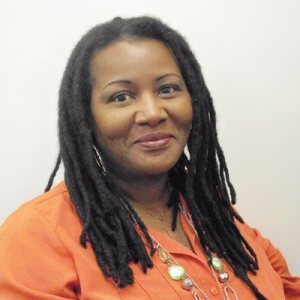 Nuzo Onoh is a British Writer of African descent. Born in Enugu, the Eastern part of Nigeria, formerly known as The Republic of Biafra, Nuzo lived through the Civil war between Nigeria and Biafra, an experience that left a strong impact on her and continues to influence her writing.
Nuzo Onoh is a British Writer of African descent. Born in Enugu, the Eastern part of Nigeria, formerly known as The Republic of Biafra, Nuzo lived through the Civil war between Nigeria and Biafra, an experience that left a strong impact on her and continues to influence her writing.
She attended Queen’s School Enugu before proceeding to the Quaker boarding school, The Mount School, York, England and finally, St Andrew’s Tutorial College, Cambridge, from where she obtained her A’ levels. Nuzo holds both a law degree and a Masters degree in Writing from The University of Warwick, England. She has two daughters and lives in Coventry, from where she runs her own publishing company, Canaan-Star Publishing.
Now recognised as the front-runner of African Horror, Nuzo is the author of The Reluctant Dead, a collection of African ghost stories. Her latest book, Unhallowed Graves, will be published on 28th June, 2015 and is now available for pre-orders from Amazon.
The Book
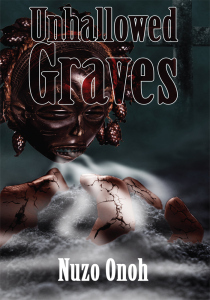 Unhallowed Graves is a collection of three chilling stories of revenge by the restless dead buried in Unhallowed or accursed Graves.
Unhallowed Graves is a collection of three chilling stories of revenge by the restless dead buried in Unhallowed or accursed Graves.
“Night Market – Oja-ale” narrates the terror of Oja-ale, the night market run by the dead. Everything can be bought for a deadly price in Oja-ale. Alan Pearson is a sceptical British diplomat, contemptuous and dismissive of native superstitions…. Until the day he receives a terrifying purchase from the Night Market, which defies Western science and logic. And Alan must finally confront the chilling truth of Oja-ale.
“The Unclean” follows the tragedy of a grieving mother forced to take some deadly actions when her dead child returns to haunt her with terrifying consequences.
“Our Bones Shall Rise Again” is inspired by the 1803 tragedy of Igbo-Landing in Georgia USA. The ghost of a drowned slave is resurrected from his watery grave to exact revenge on the family that betrayed him and sold him into slavery, with tragic consequences.
The Interview
Q. Your second book “Unhallowed Graves” tells three different tales of angry ghosts buried in cursed grounds. What inspired you to write these stories?
A. Several factors inspired the three long stories that make up the collection in Unhallowed Graves. The first story, The Unclean, was inspired by a personal tragedy which brought up the archaic burial traditions of my people, turning what was a terrible loss into a harrowing trauma that ended with exhumation and an unmarked grave. A few years later, I heard that a good family friend had been forced to drink the corpse-water used in washing her husband’s dead body. The woman was also made to spend three nights in the forest with her husband’s corpse to prove she had no hand in his demise. These two incidents inspired me to write about The Unclean, where my protagonist is haunted by her dead child buried in accursed grounds.
The second story, Night Market, was inspired by a story told me by a good friend and is the first story I have written with a white protagonist. It narrates the story of a night market run by the dead, where everything can be purchased for a deadly price.
The final story, Our Bones Shall Rise Again, which is my favourite story, was inspired by the tragedy of Igbo Landing. Amidst the marshes of Dumber Creek in St Simon’s Island, Georgia, USA, lies a site known as Igbo Landing. On that site in May, 1803, a group of enslaved Igbos opted for mass suicide by drowning rather than be taken into slavery. The slaves had been captured in West Africa and during the voyage, the Igbo slaves rose up in rebellion, taking control of the ship and drowning their captors. The Morovia ran aground in Dunbar Creek. The Igbos, upon assessing their situation, resolved to walk home over the water rather than submit to the living death of slavery. They walked into Dunbar Creek in a collective act of deliberate suicide. It is said that as they took this fatal march, the slaves chanted that the water spirits brought them to the Island and will take them home again. This story of resistance towards slavery has formed part of African-American folklore and the site has become a popular tourist destination today. It is believed that their ghosts still haunt the beaches, with the sound of slave chains still reverberating at Dunbar Creek where the incident happened in the wee hours of the morning. There are also reports of eerie sounds and shadows in the marshes at Igbo Landing. Legend has it that the voices of the dead slaves at Igbo Landing still cry out from those foreign waters, demanding to come home to Igbo-land.
My story, “Our Bone Shall Rise Again”, is a work of fiction which merges history with lore, hauntings and possessions, superstitions and mystical occultisms, giving me an opportunity to return their restless spirits back to Igbo-land and give them their long-sought revenge in the process. In fact, I dedicated my book, Unhallowed Graves, to those brave and tragic Igbo souls of Igbo Landing.
Q. How do these stories connect with the ghost stories in your first work, “The Reluctant Dead?”
A. The Reluctant Dead was all about hauntings by ghosts with unfinished business. The stories showcased some of the different kinds of death in Igbo culture, such as untimely death, sudden death, accursed death, tragic death and bad death. There was an element of revenge in the six stories in the collection. In contrast, the three long stories in Unhallowed Graves, focus on hauntings by a particular type of ghost – those buried in accursed or unhallowed grounds. In Igbo custom, especially in the rural villages, certain corpses were deemed unfit to be buried in consecrated grounds or amongst the rest of the family in a communal compound. These were bodies of people whose deaths were viewed as unclean, accursed or bad, such as lightening victims, suicides, executed criminals, mothers that died in childbirth etc. Other categories included dwarves, albinos, children born with “unnatural” defects such as a set of teeth, extra fingers/toes and children that died before their parents, especially, born-to-die children, where a child keeps returning to the same family to torment the family by dying young in each reincarnation. All these bodies were cast into the bad forest with nothing to mark their graves. Unhallowed Graves therefore tells three different stories of hauntings by people buried in accursed grounds. Naturally, one would assume that such ghosts would be bitter and out for revenge. Thus, just as in The Reluctant Dead, the three stories of Unhallowed Graves are about unfinished business but most especially, revenge by angry spirits from accursed graves.
Q. You call the genre African Horror – how does it differ from other works in the horror genre?
A. I think I discussed this issue in one of my earlier interviews. African Horror is a cesspool of terrifying supernatural entities and superstitions, which very few cultures can rival in their sheer volume and malevolence. Africa is a culture that accepts the supernatural as a normal part of everyday living. So for instance, here in the West, if a person dies, there can be only two main causes of death, natural causes or unnatural /unexplained causes, usually murder or manslaughter. But rarely are the deaths attributed to supernatural causes. But in African culture, in particular the Igbo culture about which I write, no death is simply natural unless it is an old person who has fulfilled all social and cultural obligations. Otherwise, every death is viewed as suspicious, an act of the ancestors, gods, bad karma, ghosts, witchcraft, night-flyers, mami-water, juju and a host of other supernatural causes. The type of death and the kind of burial will generally determine the type of ghost that manifests, the level of malevolence exhibited and the degree of intervention required by powerful witchdoctors or Pentecostal prayer warriors. Consequently, African ghosts always have some unfathomable agenda and that is what I think makes the horror more unsettling and chilling than mainstream horror. And just like the Japanese Kaidan horror, African Horror is geographically specific and showcases the culture, beliefs, traditions and practices of the people (in my case, the Igbo tribe in the main) within a haunting context.
Q. Who are some other authors who write in the genre?
A. I’m sure there are some African writers of horror stories, albeit, their stories are not always set in Africa. Writers such as Akua Lezli Hopes and Nnedi Okorafor who are of African descent write more on Fantasy than pure African horror with our mish-mash of cultures, superstitions and dark practices. Ben Okri is another brilliant writer in the genre. But my all-time hero and the person that inspired in me the love for the genre, remains the great Amos Tutuola, whose books, The Palm-wine drinkard and My Life in the Bush of Ghosts have become modern African classics. I’m hoping to see more African female writers in future.
Q. Tell us about your choice to set the stories in pre-Colonial, Colonial and Modern Africa. In what ways do you think the supernatural tie these three periods together, in the stories themselves, and in real life?
A. Yes, I decided to set my stories in various significant periods of Nigerian history. The story, Our Bones Shall Rise Again, is set in pre-colonial times when the slave trade was at its notorious peak. At that time, Christianity was yet to have an impact on the traditions and beliefs of the Igbo people of Nigeria. Divinity, ancestral veneration, occultisms and a belief in reincarnation was the norm. Thus, my protagonist, Oba, the greatest medicine-man in the twelve villages and beyond, had an unshakable faith in the powers of the ancestors and deities, a belief that convinced him to lead his clansmen in a collective act of mass suicide by drowning rather than be taken into slavery. The deities had promised him a future resurrection to exact vengeance on the wife that betrayed him and sent him into his unhallowed grave underneath the murky waters of the unknown sea. The second story, The Unclean, is set in colonial Nigeria when Queen Elizabeth 11 “owned our lands and our calendars”. By that time, the impact of Christianity was very powerful on Igbo society. My protagonist, Desee, was a devout catholic and an ex-pupil of Irish Nuns. Yet, when her dead son started haunting her, she resorted to the long-held practice of occultism and divinity. The final story, Night Market, is set in modern-day Nigeria, right inside the vibrant city of Lagos, the commercial capital of Nigeria. The characters are not of the Igbo tribe, as in my other stories. Yet, we see a similar belief in the supernatural and a strong faith in occultism, similar in both the Yoruba and Igbo tribes of Nigeria.
I have tried to show that despite the impact of western civilization, Africans still cling to their old beliefs, customs and practices. While education, religion and globalization may have diluted these beliefs in some areas, deep down, most Africans believe in the existence of some supernatural forces, entities, deities and gods. Ancestor veneration and worship as well as a belief in reincarnation is still a strong force. While some people may not actively practice the customs, deep down, most Africans, regardless of education or status, believe in something not quite of the visible world. As the saying goes, you can’t be a real African unless you believe in something…anything… supernatural.
Q. Tell us about the Night Market
A. Night Market is different from my other stories because for the first time, my protagonist is white. I first heard about the urban legend of a night market forbidden to the living from a good friend who was a white man living in Nigeria at the time. He told me he’d heard about it from a highly educated and influential Nigerian, who advised him to steer clear of the market. My friend was of course sceptical of the lore and his scepticism bred in me a desire to shatter his safe beliefs. As everyone knows, we writers are word-magpies and I saw the possibilities of a good ghost story in my friend’s narrative. My friend also suggested that I include a white person in my stories for a change. We felt the impact would be stronger when his western beliefs are shattered by the mysterious realities of African occultism. So Night Market was born; a dark and silent market run by the dead, where everything and anything can be bought for a deadly, non-negotiable price.
Q. Are you working on any other stories and books we might hear about in the future?
A. Yes, right now, I’m working on my next African Horror collection with the working title of The Sleepless, due out next year, on the same date I release all my horror works, 28th June. There is a belief that children and babies are innocent, helpless and vulnerable. But what happens when their innocent sleep is murdered; when they are abused by adults; when their corpses are dishonoured by the grown-ups; when the soil sours their souls and they return to exact revenge on the living? Using African superstitions about restless infant ghosts, I hope to disabuse the notion that children are helpless and in the process, bring to my readers some terrifying tales of revenge by angry ghosts of infants, mostly, victims of adult cruelty.
Q. Is there anything else you would like our readers to know?
A. Only to say a massive thanks to all the readers that supported my first book, The Reluctant Dead, with tweets, reviews, emails and purchases. Their support inspired me to continue in the genre and I would appreciate more reviews and tweets for Unhallowed Graves. For anyone interested in finding out 10 top things they didn’t know about African Horror, please visit http://www.femalefirst.co.uk/books/nuzo-onoh-unhallowed-graves-817451.html and read all about it. Finally, please get your copy of Unhallowed Graves today from Amazon.com. And please make the 28th of June of every year your date with my new books on African Horror. Again, my gratitude for all your support.


May 19, 2015
Facebook’s “real name” policy marginalizes senior, pagan member of Anne Rice fandom
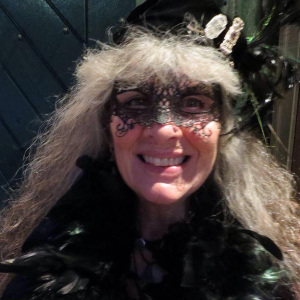 Anti-pagan bias is likely at the root of the recent harassment of outspoken Anne Rice fan and vocal, public pagan Granny Goodwitch, but the unintentional ageism of Facebook’s current real name identification processes are the reason her trials and tribulations are dragging on for days and days. If Granny was a young person with a cellphone and a scanner, this could have been quickly resolved. Instead, it has gone on for close to a week and shows no signs of an immediate resolution.
Anti-pagan bias is likely at the root of the recent harassment of outspoken Anne Rice fan and vocal, public pagan Granny Goodwitch, but the unintentional ageism of Facebook’s current real name identification processes are the reason her trials and tribulations are dragging on for days and days. If Granny was a young person with a cellphone and a scanner, this could have been quickly resolved. Instead, it has gone on for close to a week and shows no signs of an immediate resolution.
Facebook’s “real name” policy has never been as strict as other social media platforms, such as Google+, in that Facebook does not require users to use their legal names, only the names that they use in real life. That is why it came as an unpleasant shock and surprise to many members of Anne Rice’s 1.1 million strong Facebook fandom, who Anne calls “The People of the Page,” when an active and beloved member of their community, Granny Goodwitch, had her Facebook page unceremoniously banned by Facebook.
Granny is a real-life pagan who uses her unusual moniker in her day to day life – therefore it should be protected under Facebook’s policies as a real name. The name is also associated with her identity as a witch and her Wiccan belief system. Since she receives mail under the name and uses it in her offline life, she should qualify for an exemption, but because she like many seniors does not own a cellphone or a scanner, she is running into roadblocks in the verification process.
Facebook’s verification processes take time. They may also unintentionally penalize seniors such as Granny, who are less technologically savvy and less likely to have broad electronic fingerprints spread all over the internet like younger people who may use their monikers on work-related sites like Monster and Linked-In, or e-commerce related sites like PayPal or Amazon or eBay. They are also less likely or to own devices like scanners that are required to produce copies of things like postal mail. Facebook says it is working on making its policies less biased, but policies such as using cellphones to verify identity still work at odds with seniors like Granny who don’t use cellphones but old fashioned land lines.
To the best of this reporter’s knowledge, it is the lack of access to the technology that is currently slowing the process. In addition to unintentional ageism, a level of classism may be at work since people who have more money are more likely to have modern technology in their homes.
Many members of the community are alarmed, including Anne Rice, who has posted twice publicly on the subject:
“Granny Goodwitch has AGAIN been blocked on Facebook! What is going on? Why is Facebook relentlessly persecuting this lovely and benign member of our FB community! What in the world is prompting this? Oh, I know, there is some regulation about real names, but FB is filled with people posting under fake and fictional names, and filled with people up to mischief with their fake names; whereas this poster is a loving, positive person, who has always offered us wonderful, informative links and comments on this page! If anybody can help us with this problem by all means do! Please contact any FB representative you might know (I do not know of any) and ask why this is happening. Is someone stalking Granny? Is someone relentlessly “reporting” her? If so, why? And for what? And why, again, would FB single out Granny, of all people, when there are so many posting under fictional names on FB?” – Anne Rice
Facebook’s real name policy is largely enforced based upon user reporting, so while there is no proof that someone is harassing Granny Goodwitch, that possibility seems likely. This could be yet another example of the real name policy, which is designed to prevent harassment, backfiring and being used as a tool for bullying.
, and others have been persecuted by bigots under the real names policy. This can happen when a Facebook user who happens to disagree with the person’s politics repeatedly reports a user.
In Granny’s case, anti-pagan prejudice is very likely work, since she is very outspoken about her beliefs, and her name is related to them. She spoke about her beliefs at length in her interview with Nola Cancel. Whoever is reporting her may dislike the nature of articles she offers to Anne Rice for reposting, and may not respect the religious significance of the Goodwitch name. Although the name has an ironic connotation, because it is also the name of a cartoon character, Granny has used it in earnest for some time.
She might also be under fire for her feminist beliefs, or be the target of someone who is simply jealous and resents her popularity and the attention she receives from Anne Rice. Anne Rice has named Granny Goodwitch her “science reporter” and an honorary member of the Order of the Talamasca, a fictional watcher society that keeps track of supernatural goings on in the Anne Rice universe.
Fellow Person of the Page Buffie Peterson started a petition to ask for the reinstatement of Granny Goodwitch, and Justin Simpson started a Q&A in Facebook’s Help Section.


May 12, 2015
My panel schedule for BayCon 2015.
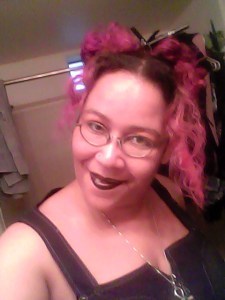 Sumiko Saulson’s blog “Things That Go Bump In My Head” focuses on horror fiction writing and features author interviews, writing advice, short stories and editorial pieces. She is the author of two novels in the science fiction and horror genres, “Solitude,” and “Warmth”, and a Young Adult dark fantasy series, “The Moon Cried Blood”, which was originally a novel. Her fourth novel “Happiness and Other Diseases” will be released October 18, 2014. She is also the author of a short story anthology “Things That Go Bump In My Head”. She writes for the Oakland Art Scene for the Examiner.com. A published poet and writer of short stories and editorials, she was once profiled in a San Francisco Chronicle article about up-and-coming poets in the beatnik tradition. The child of African American and Russian-Jewish American parents, she is a native Californian, and was born and spent her early childhood in Los Angeles, moving to Hawaii, where she spent her teen years, at the age of 12. She has spent most of her adult life living in the San Francisco Bay Area.
Sumiko Saulson’s blog “Things That Go Bump In My Head” focuses on horror fiction writing and features author interviews, writing advice, short stories and editorial pieces. She is the author of two novels in the science fiction and horror genres, “Solitude,” and “Warmth”, and a Young Adult dark fantasy series, “The Moon Cried Blood”, which was originally a novel. Her fourth novel “Happiness and Other Diseases” will be released October 18, 2014. She is also the author of a short story anthology “Things That Go Bump In My Head”. She writes for the Oakland Art Scene for the Examiner.com. A published poet and writer of short stories and editorials, she was once profiled in a San Francisco Chronicle article about up-and-coming poets in the beatnik tradition. The child of African American and Russian-Jewish American parents, she is a native Californian, and was born and spent her early childhood in Los Angeles, moving to Hawaii, where she spent her teen years, at the age of 12. She has spent most of her adult life living in the San Francisco Bay Area.
Friday
Flash, Green Arrow, and The Atom; is DC conquering TV? on Friday at 4:30 PM in Bayshore
(with Doug Berry (M), Lon Sarver)
While Marvel dominates movie theaters, DC has been quietly building a strong presence on television. Is this their best bet? Which hero should be the next to get a show?
Horror Addicts BoF and Book Release Party on Friday at 8:30 PM in Stevens Creek
(with Emerian Rich (M), Jason Malcolm Stewart, H.E. Roulo) AND Sumiko Saulson, Laurel Anne Hill, Loren Rhoads, Lillian Csernica,
Join the gang from Horror Addicts for a discussion of what’s new with them, and a book release celebration for the Horror Addicts Guide to Life.
Saturday
A Costume Is Not Consent! Dealing With Harassment at a Con on Saturday at 11:30 AM in Ballroom A
(with Violet Ruthless, Julie Shepard, Mary Anne Butler (M))
Are you wondering what to do if you feel you are being harassed while at a convention? If someone else comes up to you asking for your help with a complaint about harassment, do you know who to contact or where to take that person? Meet with some experienced con-goers, members of the BayCon staff, and a representative of FLARE (the convention safety and security team) for an explanation on what to do, who to look for, and where you can go for help.
The Persistence of Racism on Saturday at 1:00 PM in Stevens Creek
[I am moderating.]
(with Lon Sarver, Gregg Castro, Brad Lyau, Helen Stringer)
It’s been 150 years since the end of the Civil War and an end to overt slavery in the US. While some people will point to the great deal of progress made in race relations since then, others will point to the continued mistreatment of minorities, blacks being incarcerated for longer terms and at higher rates than whites charged with the same offenses, and a lack of financial opportunities for disadvantaged minorities compared to whites. Is it time to have a national dialogue on race? What issues could go into such a dialogue? What resolutions might we look for as a result?
Writing Across the Gender Divide on Saturday at 2:30 PM in Ballroom A
[I am moderating.]
(with Jay Hartlove, Sarah Stegall, Kiri Callaghan, Chaz Brenchley, S L Gray, Sandra Saidak)
Men who write stories with female lead characters. Women who write stories with male leads. What are the pitfalls in writing about someone who is fundamentally different, especially when writing in the first person? We live in a society that doesn’t encourage its members to expose all their feelings, especially when those feelings involve attraction or discomfort. That can make it difficult to understand how a person of the opposite sex reacts in the same situation that you are are in. So if a woman reads a story with a first-person female character written by a man, does the character’s reactions and inner voice ring true, or does it seem like a man who is cross-dressing? How does a writer learn to express a believable inner voice for a character that belongs to the opposite sex?
BoF: World Goth Day on Saturday at 4:00 PM in Cypress
(with AE Marling, Sarah Pugliaresi, Jean Batt, Emerian Rich (M), Seanan McGuire)
On May 23rd, join your fellow Goths in celebration of World Goth Day. (Yes, the actual Day is Friday the 22nd. Goths are mysterious and fickle — roll with it.)
Sunday
Celebrating A Girl of Wonder(land): Happy 150th Birthday, Alice on Sunday at 10:00 AM in Lafayette
(with Emily Jiang, Kevin Andrew Murphy, Kay Tracy, Helen Stringer (M))
Up until 150 years ago children’s books were mostly intended to instruct rather than entertain. All that changed when mathematician Charles Lutwidge Dodgson, under the pen name Lewis Carroll, published Alice in Wonderland in 1865. that book went on to inspire many other authors, artists, and even movie-makers. The panelists discuss the influence of Alice in Wonderland after 150 years.
Commercial Space Travel Challenges on Sunday at 1:00 PM in Saratoga
(with Berry Kercheval, Jay Reynolds Freeman (M))
Blowups, production problems, political opposition, and regulation costs are some of the problems facing commercial space travel. What does the next year look like for SpaceX, Boeing, Orbital Sciences, Sierra Nevada, Blue Origin and other entrants. Will you be able to buy a ticket to orbit, or Mars, in your lifetime?
Themed Reading: Pop Culture Invades SF/F/H on Sunday at 2:30 PM in San Tomas
(with Emerian Rich)
Gaming. LARPing. Comic books. Sometimes the things you love to spend your spare time on finds it way into the stories you love to read. Hear authors who’ve figured out how to blend pop culture and speculative fiction read from their stories.
BayCon Website



